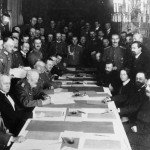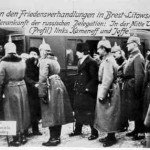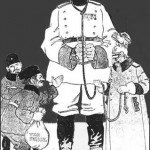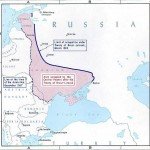
The Treaty of Brest-Litovsk was the peace agreement that formally ended Russia’s involvement in World War I, signed in the Polish city of the same name on March 3rd 1918. The path to the Treaty of Brest-Litovsk was a bumpy one, filled with demands, delays and divided opinions. The Bolsheviks – a party which derived much of its popular support from the promise of peace – found themselves under considerable pressure to produce a rapid peace settlement. Yet the Brest-Litovsk treaty was signed five months after the Soviet Decree on Peace and almost a year after Lenin’s April Theses. And even then this peace came at a great cost for Russia, which was forced to surrender vast areas of land, including important food-growing areas. The Treaty of Brest-Litovsk also created some significant political divisions, both between the Bolsheviks and their Left SR allies and within the Bolshevik Party itself. So while Brest-Litovsk fulfilled Lenin’s 1917 promise and delivered peace to the war-weary Russian people, its other outcomes were detrimental for the new regime.
The road to Brest-Litovsk began with Lenin’s famous Decree on Peace, presented to the Congress of Soviets the day after the October 1917 revolution. This decree ordered the new government to “start immediate negotiations for peace” – though it also insisted on a “just and democratic peace… without annexations and without indemnities”. In other words, any peace deal with Germany must not incur excessive costs or concessions for Russia. This condition was problematic because in late 1917 Germany was in a much stronger military position. German forces occupied all of Poland and Lithuania; some had pushed into the southern tip of Ukraine, while others were poised to move deep into the Baltic states; St Petersburg itself was in striking distance of a German advance. The new leaders of Russia were in no position to dictate terms in any treaty negotiation – and was clear that any German peace delegation would demand the surrender of large amounts of Russian territory.

In mid-December 1917 German and Russian delegates met at the Polish town of Brest-Litovsk and agreed to an indefinite ceasefire. Formal peace talks began five days later. Privately, the members of the German delegation loathed the Bolsheviks sent to negotiate on behalf of Russia; their numbers, one German delegate noted, included Jews, convicted criminals and even a woman. But the Germans, recognising the inexperience of the Russian delegation, hid their contempt and instead cultivated an atmosphere of informality, friendliness and candour. They dined and socialised with the Bolshevik group, toasting their revolution and praising them for casting off the corrupt Provisional Government and securing peace for the Russian people. As the Russians became more relaxed and confident (and on some occasions, more drunk) they leaked information about the state of their government, their military and their nation. The interim leader of the Russian delegation, Adolph Joffe, was one of the worst offenders. This gave the German delegation some useful insight into the weakness of the Bolshevik position, both domestically and on the front.
This fraternisation ended a week later with the arrival of Leon Trotsky, the Soviet commissar for foreign affairs. Trotsky ordered an end to socialising and mixed dining and demanded that all negotiations be done across the table. Whereas Joffe had been calm and conciliatory, Trotsky was indignant, defiant and confident to the point of haughtiness. As later observed by Paul von Hindenburg, he behaved “more like a victor than the vanquished”. Several times Trotsky lectured the German delegation about the imminent socialist revolution in their own country. On one occasion he even produced socialist propaganda, printed in German, and distributed it to German soldiers. Trotsky, who believed a socialist revolution would erupt in Germany sometime in 1918, also engaged in stalling tactics to prolong the peace negotiations. He demanded peace without concessions, knowing the Germans would never accept; he requested several adjournments and deferments so he could return to Russia for advice.

All this infuriated the Germans, who were impatient to end the war with Russia so they could redeploy their forces to the Western Front. Germany’s demands were initially quite modest, wanting only the independence of Poland and Lithuania – but in January 1918 the Berlin delegation presented Trotsky with a new and more expansive set of demands. Trotsky, however, insisted on peace without concessions. He began to purposely stall the process while socialist agitators working within Germany itself attempted to incite and hasten revolution. Trotsky was belligerent and stubborn during discussion, arguing endlessly over minor points, threatening to quit the negotiations and continually calling for recesses. The Germans could not believe Trotsky’s tone, one general commenting that he ‘negotiated’ as though the Russians were winning the war rather than losing it. When the Germans presented another list of demands in January, Trotsky refused to sign and returned to Russia.
“It was a device, the Bolsheviks admitted, to trade space for time, the time which they needed to consolidate their revolutionary rule in the territory they held, and to defeat anti-Bolshevik forces… Yet the space they yielded was enormous. The Treaty gave the Germans and Austrians domination over the vast food-producing areas as well as the rich mining regions and industrial zones in the south-west of now technically independent Ukraine.”
Richard J Crampton, historian
The Bolshevik party then entered a period of division over the terms of a treaty with Germany. Lenin’s wish was for that the German proposal be signed immediately: to delay was to risk a German offensive that might overrun St Petersburg and crush the Soviet government. Another faction, led by Nikolai Bukharin, rejected any suggestion of a peace treaty between the Soviets and a capitalist country; the war must be continued, Bukharin argued, to inspire German workers to take up arms against their own government. Trotsky’s position was in the middle: he argued that German treaty ultimatums should be refused but did not believe Russia’s army or the Red Guards were capable of withstanding another German offensive. These internal divisions continued until the mid-February 1918 when the German high command, frustrated at the lack of progress, suspended the armistice and ordered the bombardment of Petrograd and invaded the Baltic States, the Ukraine and Belarus. German troops continued to advance, at one point reaching the outskirts of Petrograd, forcing the Bolsheviks to relocate the capital to Moscow.

The German offensive forced the Bolsheviks back to the negotiating table in late February. This time the German delegates issued the Russians with an ultimatum: they had a five-day timeline to discuss and sign the treaty. Under the terms of this new agreement Poland, Finland, the Baltic states and most of Ukraine would be surrendered to Germany. Russia would lose 1.3 million square miles of important territory, including important grain-growing regions in Ukraine. It would surrender 62 million people to German rule, or around one-third of its total population. It would also lose 28 per cent of its heavy industries and three-quarters of its iron and coal reserves. By any measure the Brest-Litovsk agreement offered humiliating terms: it treated Soviet Russia as a defeated nation and Germany as a conquering power, entitled to the spoils of war.
With the Soviet regime at risk of defeat, Bolsheviks negotiators signed the Treaty of Brest-Litovsk on March 3rd 1918. Lenin had got his own way by arguing that any losses to Germany – a nation on the “doorstep of socialist revolution” – would be temporary; any imperialist treaties and annexations would soon be null and void. He had also threatened to resign as party leader if the treaty was not accepted. But the divisions within the party remained. Trotsky was dumped as commissar of foreign affairs; he furiously refused to attend the final signing of the treaty. At the Seventh Party Congress on March 7th, Bukharin condemned the treaty and called on the party to reject it and re-start the war with Germany. The Congress, however, was relieved to be free of the war and the threat to its government so voted to accept and endorse the treat. But the harsh territorial and economic terms imposed by Brest-Litovsk would soon be felt by the Bolshevik government, as it entered a three-year fight for survival.

1. The Treaty of Brest-Litovsk was an agreement between Russia and Germany that ended Russia’s involvement in World War I. Negotiations for this treaty began in the Polish town of Brest-Litovsk in December 1917.
2. Germany’s negotiators, having established the political and military weakness of the Bolshevik government, put forward a series of extensive demands for territory and resources.
3. Russian representatives, hoping that socialist revolution would break out in Germany, attempted to stall negotiations. The Germans threatened to end the ceasefire after negotiations with Trotsky broke down.
4. Once the treaty was finalised it had to be ratified by the Soviet government. Lenin pushed for it to be ratified immediately, however, the party was divided on whether to accept its harsh terms.
5. In February 1918 the Germans, frustrated at delays in finalising the treaty, relaunched an offensive and issued an ultimatum. The Bolshevik government ratified the treaty in March 1918. It imposed severe terms on Russia, surrendering large amounts of land, people and heavy industry to German control.
© Alpha History 2014. Content on this page may not be republished or distributed without permission. For more information please refer to our Terms of Use.
This page was written by Jennifer Llewellyn, John Rae and Steve Thompson. To reference this page, use the following citation:
J. Llewellyn et al, “The Treaty of Brest-Litovsk” at Alpha History, https://alphahistory.com/russianrevolution/treaty-of-brest-litovsk/, 2014, accessed [date of last access].
